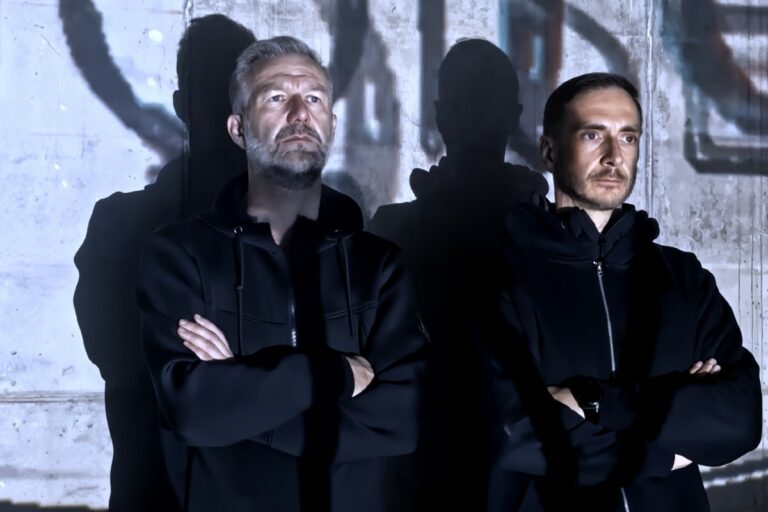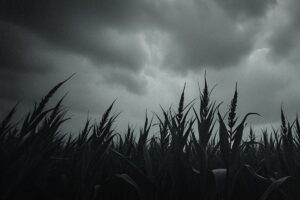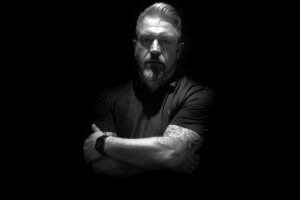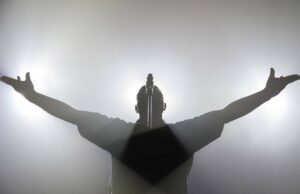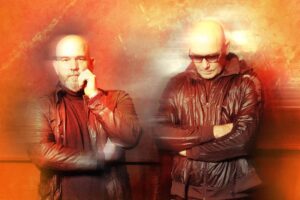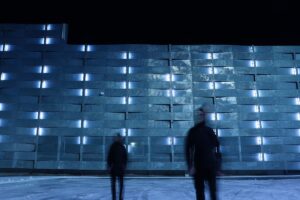One of my favorite acts right now in the dark music scene is the emerging project, White Noise TV. The band’s sound tugs at the threads of futurepop but does so in a way that feels fresh and vibrant.
Like many of the best futurepop acts, White Noise TV comes from Germany. Comprised of musicians Oliver Staats and Lars Goehring, they are preparing to release their third album, New Dawn, which represents a new start for the duo.
New Dawn arrives on June 14. I reached out to Oliver and Lars to find out more about their new start and the upcoming album. Here’s what they told me.
For people who are new to White Noise TV, introduce yourselves and tell us a bit about your backgrounds.
Oliver: I’m 44 years old, live in Berlin, and work in an engineering office. I’ve been involved in the dark electro scene since the late ’90s, sometimes more, sometimes less. My musical roots lie with Covenant, Assemblage 23, VNV, Apoptygma Berzerk, and Project Pitchfork.
Lars: I am 47 years old, live north-east of Berlin, and am an architect. I’ve been interested in electronic music for over 30 years and have been making it myself for over 20 years. My musical roots lie with Front 242, Frontline Assembly, and Daniel Myer.
Oliver: Lars and I got to know each other in 2013 through our joint construction and housing project. Lars and I where neighbors for a while. While attending the Electro Rebel Party at Berlin’s Nuke Club together at the end of 2018, we decided in a beer mood that we could do this kind of music (better 😉).
As I couldn’t program at that time, the tasks were quickly divided up: Lars provides the music, I sing along. Shortly afterwards, I got a few ideas from Lars in the form of instrumental sketches and came up with the vocals to match the mood. Then we made a few adjustments and refinements, and the first album was finished at the beginning of 2020.
For a while, wasn’t White Noise TV a trio?
Lars: When we then made a remix EP of the first album in the fall of 2020, we gained a talented sound engineer in Bernd, who became a permanent member of WNTV for the second album, Every Day Lost. Oliver started programming music himself around the same time, so the way we worked changed a bit. There were now three musicians contributing instrumental sketches. Oliver then wrote the lyrics to the most suitable sketches and contributed the vocals. I then refined things further. Bernd then took over the final arrangement, mixing, and sound design.
Oliver: There are now two of us again. We were at the point where we also wanted to perform live. Bernd was less interested in this and also wanted to concentrate on his own music project, Tonschleifer. The single “Equalizer” was the last joint release.
Around the same time, we had the opportunity to play our first live gigs at the Dark Rush Festival and the Out Of Line Weekender 2023. We are currently looking for opportunities to present our new songs live! With Sandro and Denny we also have two live musicians on drums and bass to back us up.
New Dawn is your third album. The title suggests a new era for White Noise TV. What’s different this time around?
Oliver: The title says it all! We pressed the reset button and are starting again as a duo. We weren’t and still aren’t finished with our project. A lot of ideas came up, and I was finally able to not only describe them verbally but also implement them musically.
Lars: We continued to diligently collect instrumental sketches, which we both continued to work on. Oliver came up with a lot of basic ideas this time.
The workflow was also easier for the two of us, as we were using the same DAW, FL Studio. At the same time, we both learned a lot about sound design and arrangement, as we now have to tackle these subtleties ourselves.
Oliver: In addition to our band situation, the title New Dawn also fits thematically and in terms of content. We didn’t have a fixed basic concept for the album. But for me, despite all the melancholy and despair, the songs always convey hope and a spirit of optimism, like a healing new beginning.
A lot of the songs on New Dawn are about the dynamics of relationships and how they change over time. Are these songs about real people and situations?
Oliver: The spectrum ranges from personal and autobiographical experiences to empathy with other fates and the current state of society.
Here are a few examples: “As We Fade” and “Bend the Knee” are about love, which initially has to overcome all kinds of adversity but can become all the more beautiful and profound if you face up to the challenges.
“Deep Waters” shows the fatal consequences of selfish and power-hungry decisions. “Saviour” expresses my hope for the next generation to draw the right conclusions from the mistakes of the past and to make the necessary decisions with urgency. “Phoenix” is intended to give a loved one the confidence and courage to overcome a seemingly hopeless situation. In the end, there is healing, resurrection, stronger than ever before.
It is concrete experiences that I write about and that I associate with our music. But there is always enough leeway for the listener and their own interpretations. I would be delighted if one or the other could take something out of our music for themselves.
Is there a particular song on New Dawn that’s a favorite or especially meaningful to either of you?
Lars: I have three favorites. “New Dawn” because of its simple but very impressive vocal melody. “As We Fade” because it is very rounded and balanced overall, and the song design is very mature. But if I had to choose one song, I would say “Deep Waters.” It has everything: varied sounds, good lyrics, a beat that gets you moving!
Oliver: I like the whole album and every track has its own meaning and mood that I associate with it.
But if I had to name one song that would be allowed on the desert island, it would be “Drowning Winds.” Both musically and lyrically, the song is beautifully complex, dense, and varied. The intermediate part/bridge in the song was only added shortly before completion at Lars’ request. This part adds an unexpected component and makes the song really complete for me.
Last year you guys covered one of VNV Nation’s best songs, “Forsaken.” I know VNV is an influence, but you’ve done a good job of not sounding like a copycat, which is a trap bands can fall into. Is that something you’ve thought about? How did you overcome it?
Oliver: Cover versions are always a bit of a tricky thing, of course. You have less freedom than with a remix, which of course also means there’s a big risk of sounding too similar and worse than the original.
I’ve been a VNV fan for a very long time and have been to countless concerts. The cover version was therefore a matter close to my heart and is to be understood as a tribute to a great artist for me.
Every time I listen to the original version of “Forsaken,” Ronan’s forceful vocals give me goosebumps. It’s a rather atypical song for VNV, without the usual driving bass and beats, carried mainly by Ronan’s voice. Maybe that’s why it made sense to cover the song. I learned a lot when I worked on the cover version. It was impressive to understand how complex this song actually is. In our version, we tried to create a similar energy and mood, supported by a club-ready beat and our typical pads. Of course, it was clear that my voice has a completely different color and also less volume, so the song also needed a little more around it.
I’m glad you like the result. But I can also understand that other VNV fans think it’s really bad. Hopefully people won’t hold it against us in general.
Your full-length albums aren’t available on Spotify. Is that intentional? Do you have strong feelings about Spotify and the way it treats artists?
Lars: We tried to ignore the topic of streaming for a long time. We couldn’t agree on a common vision at first. We knew that distributing our music via streaming services basically meant giving music away for free. Bandcamp is much fairer for bands. We operate in a small scene where many listeners are still willing to buy physical recordings. The support is generally great, which makes us very happy.
However, we couldn’t do without streaming services completely and decided to offer some of the music for streaming at the request of many listeners. The intention was to take advantage of the opportunities for greater reach offered by streaming platforms and to attract people who want the whole package to Bandcamp. Well, in principle that only worked to a limited extent.
Oliver: We are certainly one of the musicians who don’t benefit from Spotify. We are simply too unknown for that. Updating their distribution strategy will make this even worse.
Nevertheless, since the end of last year we’ve been releasing all of our new material on Bandcamp as well as on Spotify and co. It simply fits better with modern listening behavior and since we are in the fortunate situation of not having to make a living from our music, we will continue to do so in the future. New Dawn will therefore be fully represented. The same applies to upcoming projects, such as a remix EP from New Dawn.

